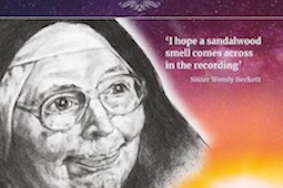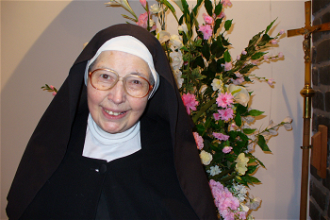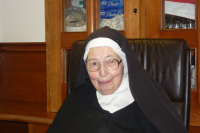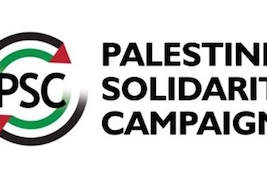Sr Wendy Beckett - a life in letters
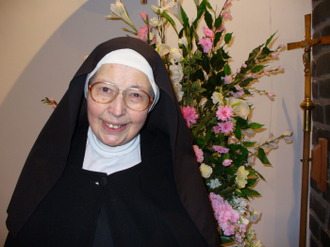
A journalist has disclosed her correspondence with Sr Wendy Beckett stretching back over many years. In the letters, Sr Wendy, who died on Boxing Day at the age of 88, talked about the nature of beauty, her childhood desire to be a nun above all else and her feelings about declining vocations to religious life.
Freelance journalist, Sarah Mac Donald, revealed the existence of the letters in a tweet and then shared further details in an article for the Conference of Religious. She writes: "I interviewed Sr Wendy Beckett in a Kensington Hotel back in 2004 as a cub reporter for the Irish Catholic newspaper. Despite her exalted status as a world-renowned art critic, she was warm, kind, open and not in the least condescending. She was then 74.
We quickly established some mutual reference points. She had been educated by the Sacred Heart Sisters in Craiglockhart in Glasgow while her father was studying medicine in Edinburgh. My, grandmother had trained as a teacher at the Sacred Heart Sisters teacher training college in Craiglockhart.
Sr Wendy was familiar with the buildings in which my Granny had lived while studying in Craiglockhart. Prior to their purchase by the nuns in 1919, these same buildings had served as a convalescent hospital for those wounded at the front in World War I. Among the most famous patients were the war poets Siegfried Sassoon and Wilfred Owen. It was an ice breaker. I remember her delight as we chatted about her happy memories of her education by the Society of the Sacred Heart.
Then there was the Irish connection! Both of her grandmothers were Irish. Her maternal grandmother, Granny Sheehan, had converted her husband to Catholicism. She told me "My father Aubrey Beckett was the son of a very fervent Catholic family - two of his brothers became mayor of Johannesburg. His mother, who could have run a battleship, was a Catholic and converted his father."
"I was the first born of my parents - both of them were thrilled and privileged to have a daughter who wanted to be a nun. I had wanted to be a nun since I could think. I never had to say to them 'I want to be a nun' - it was known."
When I became Editor of The Word magazine in 2004, which was published by the Divine Word Missionaries, I asked Sr Wendy to contribute some articles on art and she duly agreed. We corresponded over these and sometimes shared about different aspects of our lives. Though I often found it very difficult to decipher her writing! Her articles were sometimes on religious art, and at other times, she showed readers how to see God in less overtly religious art.
I cling to her definition of beauty which she gave me in that interview in 2004. "My own definition of beauty is that which perpetually satisfies us, you look at it again and again and there is more of it to satisfy us. I would say that beauty is very much an attribute of God - he is essential beauty but only those of us who have been fortunate enough to have the faith know where beauty comes from. For others it doesn't matter. If they are just responding to beauty, they are responding to Him - the pure free strong loving spirit of God."
She was also very wary of the dangers of Puritanism. "I think Puritanism is very attractive, it tempts because it narrows the world which means that you can deal with it better - beauty makes you vulnerable. You can't protect yourself against it and beauty comes from all parts of the compass - it comes in the sunrise and it comes in the sunset, it comes in the people you meet - it doesn't just come in art; beauty is everywhere."
"I think the temptation to narrow God down either to the 'religious' or to the intellectual, which is really what Puritanism is all about - confining God, is always going to be tempting because we so fear vulnerability. We so want to control things, which of course is exactly what religion is meant to be against - the whole faith is about surrender, let God be in control."
Of living in Norfolk, as a hermit under the protection of the Carmelite nuns in Quidenham, she revealed that Julian of Norwich was one of her heroes, exclaiming "What a woman! What a mystic!"
But she also stressed that "Jesus is the defining figure in my theology - Jesus however he comes - and often he comes wounded and dirty and ugly as he often comes in the Church. Who can say that the Church is beautiful? If we are looking for beauty we'd say this Church isn't beautiful. But this is his Church - it is ugly and stunted and makes very foolish decisions, but it is his Church. Jesus is the centre for me."
When The Word magazine shut down in 2008, our correspondence sadly became more infrequent as I scrabbled to create work for myself as a freelance journalist. One of the last cards to me was in 2011 after I'd sent her a catalogue for an exhibition which she hadn't been able to see. The exhibition had received mixed reviews and she was delighted "she could not make up my own mind" with the aid of the catalogue.
She had seen the exhibition 'Treasures of Heaven' at the British Museum on which she was collaborating with the art critic Andrew Graham Dixon.
But what I value most in that missive was her kind inquiry for my health. I'd had an operation and she revealed that she'd had a heart attack. "I've been whisked off to hospital twice recently, but at 81 heart attacks are not rare. But you are young and need your health. Let's ask the Holy Spirit, as we prepare our hearts to receive the gift of Pentecost, to give you health, peace and joy."
I remember back in 2004 asking her about the decline in religious life. I liked her nuanced response which recognised that the boom in vocations in the early 20th century was exceptional and perhaps for the wrong reasons.
"I think that there were too many nuns. When I was young if you wanted to give yourself wholly to God the only thing was to be a nun. Now we realise that there are many other ways to give yourself to God. Even when I entered I could see quite clearly that some people wanted to give God the fruit not the tree - they wanted to be good people serving God - that's not what being a nun is. A nun means that you give God the whole tree and all the roots. Other people should serve God in other ways - they should get married, they should be bus conductors, they should be explorers, doctors, journalists - whatever. So no, I think it is a very healthy thing that there are fewer nuns - as long as the ones that are nuns, are real nuns and passionately committed to God alone; and that is not given to everybody. It is a great privilege if you have got it."
Born in South Africa in 1930, Sr Wendy was 16 when she joined a convent and in 1950 was awarded a Congratulatory First Class degree in English literature from Oxford University. She later taught in cities including Cape Town and Liverpool.
She began studying fine art in the 1980s and wrote a book on the subject to raise money for her convent. Contemporary Women Artists, published in 1988, was followed by more books.
She lived a hermit-like existence in a caravan at Quidenham in Norfolk until 1991 when the BBC commissioned her to present a television documentary on the National Gallery in London.
Sr Wendy became well-loved for her unique presenting style. She would stand in front of paintings in galleries around the world and discuss, without autocue, the work in detail.
Sr Stephanie Walters, Prioress of Quidenham Monastery, said: "Sr Wendy lived alongside us for over 40 years and was a good friend, an inspiration and totally unique. With her openness to God in her writing and programmes she could communicate the love and mystery of God through art and literature to many who may not otherwise hear of it.
"Christmas was a beautiful time for her to return to her Lord and be with him."



